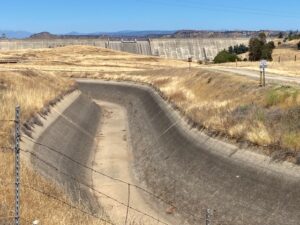The Madera County board of supervisors meeting as the Madera GSA board held a public hearing and then approved a penalty schedule for water users exceeding their water allocation. The meeting was held in the county office building on 4th Street in Madera on September 27, 2022. All five supervisors attending heard from some 25 growers and ag industry people who offered public comment, virtually all in opposition to the proposed penalties. Well over 100 people were on hand with some online and they made themselves heard with applause from time to time. Fresno TV stations channels 30 and 47 were there as well.
The penalty schedule approved imposes a $100 / AF (per acre foot) penalty for all water over an allocation in 2023, with that amount increased by $100 per year up to $500 per A/F in 2027. There are several adjustments from the proposal that had been tabled at the last meeting held September 13. There is a pre-approval process for using water meters not requiring an appeal, the interest rate for unpaid penalties was set at six percent instead of ten and the appeals process was streamlined to eliminate a staff review. Additionally, a $1,000 per farm unit penalty was imposed on growers in the Chowchilla Subbasin, but it will be waived if a group there posts in escrow by year end, $600,000 which is 50 percent of the amount called for in the GSP to fund domestic well mitigation. The vote to approve this resolution was four to one, with Supervisor David Rogers in opposition.
not requiring an appeal, the interest rate for unpaid penalties was set at six percent instead of ten and the appeals process was streamlined to eliminate a staff review. Additionally, a $1,000 per farm unit penalty was imposed on growers in the Chowchilla Subbasin, but it will be waived if a group there posts in escrow by year end, $600,000 which is 50 percent of the amount called for in the GSP to fund domestic well mitigation. The vote to approve this resolution was four to one, with Supervisor David Rogers in opposition.
Here’s how the day went.
The regular supervisors meeting had started at 10:00 a.m. After a prayer and the Pledge, Supervisor Rob Poythress asked that this meeting be held in remembrance of local grower Wayne Cedarquist whose untimely passing at the age of 71 occurred recently. This well regarded farmer had testified at the GSA public hearing just two weeks ago. Speaking in this session’s public comment segment, farmer Mark Toole said he objected to the way the 218 vote on water projects had been conducted. He said he did not receive a ballot and it was not a fair way to provide notification. After conducting a bit of other business, the supervisors moved into the GSA meeting.
Chairman Tom Wheeler called the GSA board session and public hearing to order at 10:39 a.m. After welcoming the large crowd, he recognized Stephanie Anagnoson, director of water and natural resources for the county, who introduced herself and Michael Linden, assistant county attorney, who has worked with her throughout this process. She began by introducing Laura Ramos, associate director of the California Water Institute at Fresno State, who was attending via Zoom. She was to share new results from a water meter study. There were connection difficulties, so Anagnoson began with her own PowerPoint presentation. She said with the large attendance she would do a bit of a review, beginning with a slide that documented the downward trend of groundwater levels. The graph showed, she said, “If you don’t take action, you face steeply declining groundwater levels in the future.” She said that since 2018 in a series of meetings and workshops, we have found solutions, but they are not easy.
presentation. She said with the large attendance she would do a bit of a review, beginning with a slide that documented the downward trend of groundwater levels. The graph showed, she said, “If you don’t take action, you face steeply declining groundwater levels in the future.” She said that since 2018 in a series of meetings and workshops, we have found solutions, but they are not easy.
She continued, identifying the gap between groundwater extraction and groundwater recharge. She showed that while new recharge projects could help close that gap, it would take “demand management,” that is reduced water use, to bring the aquifer into balance not immediately but over time. A key element is the previously approved allocation program and related penalties on the agenda today. She then turned to the California water code which specifies that a maximum penalty for exceeding an allocation if $500 / AF, a possible $1000 per farm unit plus an additional $100 per day for each day the violation continues.
Because information about other GSAs had been requested at earlier meetings, she showed the penalty schedules for five GSAs located south of Madera, she said, “These are places with similar levels of overdraft with significant challenges ahead.” She concluded saying that allocations are an essential part of multiple board-adopted groundwater sustainability plans and that allocations require penalties for compliance.
She briefly summarized the three resolutions being presented, one for each subbasin, Chowchilla, Delta-Mendota and Madera. She cited the changes from the resolutions presented two weeks ago – pre-approval process for flow meter and the stepwise amount of penalties beginning at $100 per AF. She said the additional $1000 penalty for Chowchilla was because the 218 fees were defeated, so there is no funding for the well mitigation process included in the GSP, which is a high priority for the State Water Board.
With that, supervisors were invited to comment, and David Rogers led off asking why a fee for Chowchilla, when there is a group of growers forming a legal entity, preparing an MOU and planning to deposit the necessary funds. He suggested that element be removed when funds are put in escrow. Anagnoson pointed out there is no money yet.
Rogers continued, saying that in 2016 the Endangered Species Act required the use of surface water to support fish populations, with 50 percent sent down the river, 40 percent for farming and 10 percent for other uses. He claimed the state was unfair to change the rules in the middle of the game and that whatever fish were endangered, farmers were the most endangered species of all, drawing applause. He went on to say, though, that 40,000 acres of rangeland in the county had been converted to permanent crops. He said pumping can’t continue without restraint… it’s not acceptable to have an entity pump whatever they want without limit. He said it’s fair to allocate water until “we can change Sacramento.” He went on to cite his experience with his own domestic well which required a $50,000 expense because of dropping groundwater levels. He said we’re going to have to work together to make this happen, then citing a quote from Jesse Jackson… “to move with haste will lay this land waste.” He went on to cite the economic importance of agriculture to the whole economy of the county affecting all socioeconomic levels. He said a glide path for water use reduction was essential, not a “dive path.” He said, “I will not be the guy who votes to put people out of business.” He concluded saying that we’re trying to reach a balance, but “I know the [per acre 218] fee is not on the agenda, but the fee must be reduced.”
Supervisor Rob Poythress said he wanted to comment before the public testimony. He said at the time SGMA was passed in 2014 groundwater basins all over California were being affected. He said often we hear the word “sustainability” and while it may have become a buzzword, when we are talking about our aquifer it means a level that allows us not to pump out more that we put in. There has been a drop in our water table of 200 feet in the last 20 years in our monitoring well. If we run out of water and the water quality is worse as we go down deeper, we’ll all be out of business. He used the banking definition of overdraft – writing a bigger check than the bank balance – and said a banker may carry you for a while but soon it has to stop. He said we can overdraft [the aquifer] with willy nilly pumping, but at some point, our aquifer will say that’s enough. He finished, saying, “In your hearts you know what the situation is. We’re looking to save the basin, save agriculture.”
At this point, connection on Zoom was made with Ms. Ramos. She presented slides and commentary about a study recently completed measuring meters on wells in the Kaweah system. Five popular brands were tested with “non-standard” installations. While much detail was presented, the summary was none of the five water meters tested in non-standard configurations performed with acceptable accuracy. She concluded, “We recommend that water meters only be installed in standard configurations.”
Note: the presentations from Anagnoson and Ramos can be found on the Madera County Water & Natural Resources website at https://www.maderacountywater.com/presentations/
Supervisor Rogers asked Ramos if there were any circumstances in which less water was measured than was being pumped. The reply, that if the pump is downstream or water flows are very slow, then the measurement might be less than actual. Anagnoson pointed out that meters like any mechanical device can degrade over time, especially those with more moving parts and that proper installation is critical for accuracy.
Supervisor Poythress then commented that a letter had been received from the state not approving the GSP that had been developed in concert with six other GSAs. He said there are 180 days to amend the plan. The criticisms he said are that the plan did not measure land subsidence sufficiently, that the GSAs did not coordinate their goals, that minimum thresholds [of water levels] are too low, set below historic lows, which he said means water extraction is not being sufficiently limited. He also said that 184 domestic wells have gone dry, higher than what is estimated in the GSP. He said if we don’t fix this [overdraft], some 800 domestic wells will go dry.
Supervisor Brett Frasier thanked Anagnoson for her work and for finding the Fresno State study. He said when the state passed to us this difficult task, they “hid in ivory towers.” But he called that a positive because all here are where the rubber meets the road. He said he had lost more sleep on this issue than on any other matter that had come before the supervisors. He asked how to protect ag and protect the water supply so that the next generation can take over these farms. He said all the board members take this seriously and these are our solutions. The state doesn’t know what the right path is. At the local level, we can be much nimbler. He said we’d appreciate any solutions that you have. What do you think we can do better, he asked. The answer can’t be to do nothing or to start all over. “We will listen to negative comments,” he said, “But please help us with solutions. We are trying to get the best outcome, which is a healthy, vibrant agriculture in Madera County.”
At this point, Chairman Wheeler offered his comments, saying he had served on the board since 2007. He said grant studies have shown that for two years on 500 wells, 95 percent of the water was used for farming. He repeated the statistic that over 40,000 acres had been converted to new orchards of almonds and pistachios. He said that’s when subsidence and dropping water levels were observed. He said we proposed a moratorium on new ag wells for permanent cropland but that failed for lack of support. He said most water [on the east side] is testing high for nitrates and now lead. He said we’re not just talking farmers being impacted but all the supporting ag businesses. If we run out of water, he said, all your nice properties are worth nothing. If we don’t do this [stop the overdraft] we are all going to suffer. It’s a tough decision but if we don’t do it, just remember who will come in and do it for you… the state will. He finished by describing a situation he had observed east of Madera on Hwy 145. He said new ag wells went in on rangeland and the neighbors’ wells immediately began to go dry.
Chair Wheeler called for a ten minute break at this point, 11:35 a.m. and said public comment would then be in order.
Resuming the meeting and asking people to take their seats, he said public comment was in order asking people to be respectful, hold applause and announcing the lunch break would be at 12:30 p.m. People were reminded to sign in, state their name and that a three-minute time limit per speaker was in effect.
Public Comment
Mark Reed was first up identifying himself as a candidate for supervisor in the fifth district. He said he was there to request that a “no” vote be cast against the fees and penalties. He said elected officials are not employees of the county but instead are representatives of the people who elected them. If you vote “yes,” he said, you are allowing the state to take our water rights, which is theft of water, a tangible asset, a theft of property values and even a theft of a free marketplace. He said stand up for those who elected you or stand down so someone else can do it. He said he would fight for the heart of Madera County, and he said he fully endorsed the new valley groundwater association.
Dan Stutz said he was from North Fork he had found farming is not easy. He said farmers are the real job creators, not government. He urged the board to listen to more of the farmers here. He said there is a problem with water management, not drought. He said the elites in Los Angeles and San Francisco don’t know more about this than we do. Citing a UN statistic of 270 million people globally suffering food scarcity, he said the people here need hope, not more taxes.
John Pero said we are working around the fringes, scrambling to meet a state mandate put in place by an oligarchy in Sacramento. He said California has no problem breaking the law to be a sanctuary for immigrants. He said we can break the law to be a water sanctuary county, regardless of what the state says. He says he’s sick and tired that the environmental movement has been highjacked by the Nazis. We’ve got to stand up to Sacramento and hold the environmental groups responsible, he said.
Stating he farms 48 acres of citrus on Avenue 9, Stuart Welk said he had been approached several years ago by county staff to get involved in this issue. He said in dealing with them, he had discovered that we are only dealing with half the farmland. He said people in [water] district aren’t being treated like people in the white areas. He said we are forced to deal with the whole problem while district farmers are not being restricted. He told the supervisors, “You have pitted farmers against farmers.” He said now, all the new plantings in Madera are all in the irrigation district and that 90 percent of new wells are in district land.
The Leadership Counsel’s Madeline Harris spoke next saying her group would be happy to work with the GSA to communicate to disadvantaged communities. She said if we want to keep decisions local, we will have to work together. She said she wanted to remind everyone that there are people in Madera County who have no running water and no water to drink because their household wells have gone dry.
Grower Kevin Herman of the Specialty Crop Company said he was there to thank the supervisors and Stephanie [Anagnoson] for tweaking the resolutions on penalties and fines as had been requested two weeks ago. He said thanks for listening to us, but he also he wants to see budgets that show how fees are being used. He said charging $246 per [irrigated] acre may not sound like a lot, but for the county that represents $22 million and for his company some $700,000. He said he’s part of the problem and wants to be part of the solution, but he asked, “Don’t collect money you don’t have a need for. Please only assess us based on what you need.”
Mike Alamari said he is a local businessperson, not a farmer. Many hands were raised when he asked who had a mortgage or other loan on their property. He said you are going to collect all the fees in five years needed for projects that won’t be completed over a much longer time frame. He said even the Raftelis rate study says that all fees will be collected before any benefits are enjoyed. He asked that fees and penalties be delayed for six months and have a seminar for everyone to inform them. He objected to the way the 218 vote had been structured. He said one vote should be counted for each acre… one acre, one vote; 1,000 acres, 1,000 votes. He finished asking why expanding cities is fine but expanding farms is bad.
Next up was attorney Michael Titus of the Wild, Carter & Tipton law firm in Fresno. He reminded the group that he had announced a lawsuit against the GSA at the last meeting over the conduct of the 218 vote and that his group also objects to these penalties. He asked how a penalty of $1,000 can be applied to Chowchilla, saying “Isn’t that something they voted against?” He said there still seems to be calibration issues for water measurement and said he respectfully asks the board not to impose the fees. (After the meeting, he told this reporter that his firm is seeking a temporary injunction to stop the collection of fees until the case can be heard in Madera Superior Court.)
Steven Shahbazian also identified himself as an attorney but from a family farming background, owning 80 acres of trees in Fresno County. He said the fees if applied to his property would double his property taxes. He said we’re being told to stop drip irrigation because it isn’t as good as flood. He said all this was on speculation about what the weather would be between now and 2040. He said the 218 projects were collecting money in advance of specific projects. He said if you are trying to recharge the groundwater basin, you must do so in a complete population process. You can’t say these people have to pay and others don’t. He said if he were here, he would make a run to the county assessor’s office to reduce his assessment to dry land farming. He asked the board to table the matter for now.
Another political candidate, Rabbi Amnen Shor, running for State Senate District 14, said the solution for this problem is not extracting more funds from these farmers. He complained that Stockton and Sacramento dump their sewage in the fresh water of rivers causing pollution. He told the supervisors their job is to stand up to the state. The state has money to do this, but they haven’t done it. He said if we don’t have water here we have no life. He drew an appreciative chuckle from the audience when he said he would work with them to stand up to the “meshuggenehs,” the crazy environmentalists.
Jay Mahil from a farming company in Chowchilla said he was here representing the Chowchilla growers’ group. He said a corporation has been formed, the Chowchilla Subbasin Growers Group, with bylaws being drafted. He said there is a meeting with the county staff on October 4. Supervisor Rogers interjected offering his congratulations saying the county should follow this example. Mahil continued saying that as a grower he asked that the board hold off on the penalties. He said as farmers, we can’t make quick changes mid-season.
Another grower group, the Madera Ag Water Association or MAWA, was represented by Noah Lopez who referenced a letter sent to the board asking that results of metering not be in the public record and that those holding a California engineers license be allowed to verify pumps, expanding the list of vendors for that work.
Representing the Punjabi American Growers Group with 250 members farming 100,000 acres in Fresno and Madera Counties, Jasbir Singh Sidhu said he had spoken at the June meeting as well. He asked the board to listen to the people. He said holding off makes perfect sense. What happens if it doesn’t rain in the next ten years… will there be more penalties? He asked why cloud seeding was not being considered. He said the people here will help you stand up to Sacramento.
Arshdeep Singh spoke next saying he was a member of the group as well, and that there is a lot of talk of sustainability. He said as a younger grower he was concerned that his young children could continue the family farming tradition when they were older because with these taxes, he won’t be sustainable, and he’ll be out of business soon. Referencing the bank account discussion, he asked, what are the projects on the supply side of the water equation, putting more into the account.
Laura Gutile referenced her comments from the last meeting. She’s a fourth generation farmer with 18 acres remaining. She said the conversion of rangeland to farming had been mentioned but what about the conversion of farmland to housing, particularly the developments with home prices starting at $250,000 and up. What are we doing with these micro-cities for the high middle class but nothing for our employees with lower incomes.
With farm ground on the border of Madera and Merced counties, Larkin Harman said she reduced her water use by not planting irrigated wheat and lost out on high market prices, only to realize the allocations had been delayed a year. She said the GSA is not ready for penalties when Irriwatch identified 16” of ETAW on her dryland wheat. She said technology is out there that can measure water flow by analyzing the power used on pumps from PG&E bills. She asked how water would be measured that crossed county lines. She said there are many questions to be answered before the penalty phase.
Grower Mark Peters asked why Madera County is “leading” the region with the highest rates and fees. He cited comments last meeting from Jim Maxwell of Agriland Farming who said Madera’s rates were the highest he’s faced in farming across many GSAs. Peters said Madera should be in the middle of the pack. He referenced comments from Anagnoson that said the most cost effective recharge work is done by private landowners, asking so why such expensive massive projects are in the plan. He said no one believes the Sites dam will happen but fees are being collected. He said Supervisor Frasier had asked for solutions, so he wanted to propose five. He said they are asking staff for more information about other GSAs; getting grower involved; retracting the vote on the fees since there is a lawsuit anyway; and delaying a decision on the penalties since there is now a six month window from the state.
Speaking as a crop consultant and as a farmer, Jose Hernandez said it’s not only farmers being hurt by these fees but also their employees who will lose their jobs. They need to be considered.
Grower Ralph Pistoresi who has been consistently vocal in opposing fees and penalties spoke, offering condolences on the very recent and untimely passing of Wayne Cedarquist. Supervisor Poythress reminded him he had opened the supervisors meeting dedicating the session to this popular grower. Pistoresi moved on, calling the projects hocus pocus when recharge can be done without spending millions of dollars. He said the county had been turned against itself with farmers turning on each other. He said that the supervisors are the ones the state is using to put people out of work and that they should push back. He said we need to bring all the GSAs together and push back against Sacramento.
Turning to online comments, Chairman Wheeler recognized Sue O’Connor from Oakhurst. She said it’s not necessary to implement penalties for at least six months. She said it’s not the role of staff to discipline adults by proposing penalties. She concluded saying the supervisors are “henchmen of the state.”
Speaking online for MAWA, Jack Rice called attention to the letter submitted to the board asking that the budget for projects in 2023 and the related fees be adjusted to current conditions. He said land repurposing won’t be up and running and the rate study shows a plan for significant reserves by 2027. He said it looks like fees could be reduced by 50 percent. He went on to say that growers have lost confidence in Irriwatch and that the competing technology, Land IQ, is already being used by 30 other GSAs.
It was now about 12:50 p.m. and the chair called for a lunch break until 2 p.m.
It was 2:08 when the session reconvened with more public comment. Mark Toole led off asking that the board unite the county and not act in haste. He said by postponing acting until after the holidays, the entire county could be brought together. He pointed out that in France when farmers have major complaints, they put together a tractor rally and go to the capital. He said we can drive our tractors to Sacramento. He said farmers today are going in the hole financially. He said let’s go to work… give us a job.
Makoun Singh said ground water levels are falling all over the world, not just here in the San Joaquin Valley. We should have access to water so we can produce our food here, not in other countries. Farmers don’t waste water… it goes on trees or into the ground. It’s unjust to make only farmers pay these costs.
Saying he represented the California United Water Coalition, Mark Nakata stated he has attended three previous meetings, but this is the first time he’s spoken. He said he was hopeful we can come together to find common sense solutions. He told the board members he was offended that they did not push back hard enough against the state, the real cause of the problem. He said his association is joining with other groups around the state to have influence. He said he has talked with a lot of Madera County growers and heard a lot of good ideas.
Robert Bishel said his family has been farming in Madera since 1912. He said his grandfather made the deal with the Madera Irrigation District to the run the two main canals directly through their ranch. He continued, saying you [supervisors] have all the power and authority to stand up against the state. He said we don’t have to accept this evil plan that is coming down because the state mandates it. The battle right now is not among us and you and city people. “The battle we’re having right now is between good versus evil,” he said. If we take the next six months and we all come together with the things we know, we can hammer out a plan. If you take one million acres out, you put the whole burden on white land. He said he owns white land and “ditch” property. He used the example of the last drought, saying it was followed up with a wet year with a 160 percent snow pack. He said six months after they gave all the water for farmers and agriculture to re-percolate the water tables, we were back on line. The experts said it would take ten years. He contended, the minute you give us the snow pack and the rain that comes from the Sierra Nevada, through flood irrigation we can re-percolate the water tables. He went on, saying we used to be all flood irrigation and sprinklers with mass volumes of water and the standing water table was always the same. He said when we went to drip irrigation our water tables began to drop. We took away the ditch water. Our ditch water went from 40percent down to anywhere from zero, one or five percent. He concluded, farmers can’t re-percolate the water table unless that water is made available.
Recalling how the World War II generation got things done, Haig Der Torossan urged that same approach to problem solving today. He said there are enough penalties in farming, such as the weather, so no new ones are needed. Solving the problem is the main thing, he said, not listening to the “Sacramento bureaucrats.”
Making the last public comment, Alex Lehman offered a prayer for Divine help “to expose the evil in this group and this county.” He urged the supervisors to listen to the people in the room.
With no other speakers, Chairman Wheeler closed the public hearing at 2:30 p.m.
Board Discussion
Discussion turned back to the board members. Supervisor Rogers said he had heard a lot of good ideas. He urged that a budget adjustment for projects be developed as soon as possible. He said that once pump meters are certified, they should be accepted as accurate going forward unless the county could show results are wrong. He said accurate measurements are needed before penalties can be imposed. He said, “We can’t move too fast.”
Chairman Wheeler referenced the concern about “micro-cities,” the new housing developments in the county. He said the board had made certain that developments had water balance before they were approved. He said the whole board had been adamant about that. He pointed out his and his family’s long experience in farming, tree fruit and ranching. He concluded saying, “Our water is still dropping, and we have to control that some way.”
Supervisor Poythress thanked the group for their testimony. He said there have been five to six years of committee work and public meetings. He said people have been heard and changes made. He said budgets for specific projects will be voted on in the next five weeks. He went on to say that the complaints about Irriwatch have been noted and other options for satellite technology are being actively considered. He agreed that measurements must be accurate and accepted as accurate. Regarding penalties, he pointed out that if growers stay within their water allocations, there will be no penalties imposed. He used a traffic analogy saying that if you exceed the speed limit you are liable for a traffic ticket and fine. He said if there are not penalties for water use, the tendency could well be to relax and pump away. He said he was not asking farmers to do anything that he wasn’t doing on his own family’s operation.
Speaking about his experience in the assessor’s office, Supervisor Frasier said he believed it would be possible to keep the information confidential from water meters on individual farms. He then asked Director Anagnoson if she could provide current detail about meeting allocation goals across the basin. She replied that based on Irriwatch, in the Madera Subbasin, about one-third of the farm units are over their allocation. In the Chowchilla Subbasin, about half are over. Discussion continued with Anagnoson saying that in Madera, out of a total annual ETAW allocation of 196,000 AF, there have been 172,000 used through nine months of 2022. In Chowchilla with an 87,000 AF allocation 82,000 have been used to date. Frasier admitted that no one wants to kick this can down the road more than he does, but he referenced Mr. Torossan’s comments and said decisions must be made now.
Motions Made
Supervisor Poythress asked for the floor and made a motion that the penalties be approved at $500 per AF with no stair step and with the added $1,000 per farm unit in Chowchilla, along with the other items in the resolution on the agenda. After a long moment, Chairman Wheeler offered a second. Frasier restated his belief the phased in “stair step” is needed, with Poythress replying that he didn’t see the $100 / AF as a deterrent. Frasier said that it took a long time to get into this hole and it will take a long time to get out. He said he was concerned that if the penalty started at the top, there would just be more lawsuits and even civil disobedience. He said he couldn’t support starting at the $500 level. On the roll call vote, Rogers, Frasier and Supervisor Leticia Gonzalez voted “no,” defeating the Poythress motion and drawing a round of applause.
Gonzalez said she agrees with Frasier that the penalty should be tiered in and that after the first few years it can be reassessed. If there is a huge overdraft and it’s obvious people are not acting in good faith, the numbers can be reevaluated, she said. Rogers commented that he agreed with tiering the penalty and he thought there should be a much smaller amount on the first 10 percent of the over-allocation water. Frasier said it seemed to him that everyone wants to be in compliance. Speaking to the audience he said had heard the challenges from the speakers. He said his challenge to them in turn was if the rate is set at this lower level, then next year show that you’re in compliance… that we’re all in this together. He also acknowledged that the need for fees for infrastructure will continue to be considered. He said he’d rather have work done on growers’ property than their fees.
everyone wants to be in compliance. Speaking to the audience he said had heard the challenges from the speakers. He said his challenge to them in turn was if the rate is set at this lower level, then next year show that you’re in compliance… that we’re all in this together. He also acknowledged that the need for fees for infrastructure will continue to be considered. He said he’d rather have work done on growers’ property than their fees.
Fraser then moved that the stair step fees be implemented and that the sentence in the resolution about meter results being public be removed, as requested in the MAWA letter. Gonzalez seconded. Rogers said he loved the idea that fee dollars could be spent on dollars on individuals’ farms keeping the work in the private sector. Poythress predicted that with the proposed $100 / AF we will come back next year and see abuse of the allocation, while others will suffer from staying within their allocations. More clarification was offered from Anagnoson confirming the resolution. Rogers said the deal killer for him is the extra fee for Chowchilla. Anagnoson explained that the $1,000 would be taken out as long as the money is put in an escrow account or there is funding for projects [specified in the GSP.] Frasier added that to his motion. Gonzalez agreed and on the roll call vote, Frasier and Gonzalez voted yes, Poythress stated he was felt the stair step was wrong but would vote in the affirmative, and Chairman Wheeler said he felt that those growers with money would take advantage of the low penalty, but he would vote in favor. Rogers was silent but his vote was recorded as a “no,” so the measure passed four to one.
affirmative, and Chairman Wheeler said he felt that those growers with money would take advantage of the low penalty, but he would vote in favor. Rogers was silent but his vote was recorded as a “no,” so the measure passed four to one.
Chairman Wheeler thanked everyone for being there and moved the meeting back to the regular supervisors’ agenda with a closed session at 3:25 p.m.
DISCLAIMER OF RESPONSIBILITY; Waterwrights strives to provide clients with the most complete, up-to-date, and accurate information available. Nevertheless, Waterwrights does not serve as a guarantor of the accuracy or completeness of the information provided, and specifically disclaims any and all responsibility for information that is not accurate, up-to-date, or complete. Waterwrights’ clients therefore rely on the accuracy, completeness and timeliness of information from Waterwrights entirely at their own risk. The opinions expressed in this report are those of the author and do not represent any advertisers or third parties.
ALL RIGHTS RESERVED. Copyright 2022 by WaterWrights.net
Madera County is comprised of three subbasins, designated by the CA Department of Water Resources as critically overdrafted, and “high priority”: (1) the Chowchilla Subbasin; (2) the Madera Subbasin; and (3) a portion of the Delta-Mendota Subbasin. Each of these subbasins submitted a Groundwater Sustainability Plan (GSP) by January 31, 2020. These subbasins are required to achieve “sustainability” by the year 2040. The method by which sustainability will be achieved will be illustrated in the GSP, which was be drafted in partnership by the irrigation district, water districts, cities and Madera County. The Madera County Groundwater Sustainability Agency (GSA) is administered by the Madera County Department of Water and Natural Resources: Stephanie Anagnoson, Director, 200 W. Fourth Street, Madera, CA 93637, (559) 675-7703 x. 2265 or (559) 675-6573. The County of Madera Board of Supervisors is the Board of Directors of the GSAs for the three subbasins. The current board is composed of five members: Robert Poythress, Brett Frazier, Letitia Gonzalez, David Rogers and Tom Wheeler-chair.

































